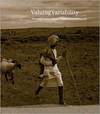This study reveals that there is clear demand from pastoralists and farmers in Malawi and Tanzania for climate information services via radio and mobile phone. Both radio and mobile phones are in common use, and are rated by farmers and pastoralists to have great potential as effective and trusted channels where they can access various climate information services. Rainfall patterns, temperature data and forecasting services – both weekly and daily – were mentioned as particular needs.
Year of publication: 2015Organization: Programa de Investigación sobre Cambio Climático, Agricultura y Seguridad Alimentaria (CCAFS)
Topic: Cambio climático, Educación, Resiliencia
Language: English
Type of document: Técnico, Científico
Geographical coverage: África Oriental, África Meridional
The theoretical framework for the scientific understanding of the drylands is almost the opposite today of what was mainstream in the 1970s, but the methodological infrastructure of analytical tools and practices is still catching up. As researchers and practitioners involved in dryland development depend on such infrastructure, they are often in danger of silently reproducing the old theoretical horizon even when manifestly operating in the new one. This is the issue this paper sets out to discuss.
Year of publication: 2015Organization: Instituto Internacional de Medio Ambiente y Desarrollo (IIED)
Topic: Resiliencia
Language: English
Type of document: Científico
Geographical coverage: Global
The major livestock countries in the Sahel (such as Niger, Mali and Burkina Faso) offer little support to the livestock sector, both in proportion to the general State budget and compared to the support provided to crop farming. This brief, produced in partnership with the APESS network, is based mainly on data collected in four countries: Burkina Faso, Mali, Niger and Senegal. In the brief it is argued that the reasons for the paradox between a livestock sector with considerable stakes and (relatively) weak support are many, for instance many decision makers, see herders as affluent populations, meaning their vulnerability to climate hazards is often not considered.
Year of publication: 2015Organization:
Topic: Economía
Language: English, Français
Type of document: Técnico
Geographical coverage: África Occidental
This publication aims to determine the economic contribution of camel milk to pastoral households in Somali Regional State, in eastern Ethiopia. It also looks at all other value chain actors incolced in the marketing of camel milk, and tries to assess camel milk marketing channels and price margins along the value chain.
The study shows that camel milk makes a substantial economic contribution to pastoralist households and those involved in marketing camel milk, and there is good potential for market-oriented camel dairy development.
Year of publication: 2015Organization: Instituto Internacional de Medio Ambiente y Desarrollo (IIED)
Topic: Economía, Seguridad alimentaria
Language: English
Type of document: Técnico
Geographical coverage: África Oriental
This book is a challenge to those who see the drylands as naturally vulnerable to food insecurity and poverty. It argues that improving agricultural productivity in dryland environments is possible by working with climatic uncertainty rather than seeking to control it – a view that runs contrary to decades of development practice in arid and semi-arid lands. Across China, Kenya and India – and most other dryland countries – family farmers and herders relate to the inherent variability of the drylands as a resource to be valued, rather than a problem to be avoided. By exploring these vibrant agricultural economies that take advantage of variability, this book inverts longstanding negative views about food security in the drylands.
Year of publication: 2015Organization: Instituto Internacional de Medio Ambiente y Desarrollo (IIED)
Topic: Economía, Seguridad alimentaria, Tierra, Resiliencia
Language: English
Type of document: Técnico
Geographical coverage: Global
La présente loi fixe les principes fondamentaux et les règles générales régissant l'aménagement et la gestion des espaces pastoraux et sylvo-pastoraux, l'utilisation et le développement des ressources pastorales, la transhumance pastorale et la mobilité des troupeaux.
Year of publication: 2015Organization: Autores individuales
Topic: Tierra, Organización
Language: Français
Type of document: Políticas y legislación
Geographical coverage: Norte de África
L'objectif de cette étude est d’améliorer durablement la gestion des conflits liés à la transhumance transfrontalière en Afrique de l’Ouest, dans un contexte de changements globaux (variabilité et changement climatiques, pression foncière, dégradation de la biodiversité, maladies animales émergentes et ré-émergentes, etc.). Elle a permis notamment d’améliorer les connaissances sur les déterminants de la transhumance transfrontalière et des conflits, d’analyser le cadre politique et juridique, de documenter les innovations et les bonnes pratiques de gestion durable des ressources pastorales, et de proposer des options stratégiques de prises de décision pour une gestion apaisée de la transhumance transfrontalière en Afrique de l’Ouest.
Year of publication: 2015Organization: Autores individuales
Topic: Conflicto, Tierra
Language: Français
Type of document: Técnico
Geographical coverage: África Occidental
Resource mapping can assist in investigating rangeland management systems, negotiating resource management plans, and implementing and monitoring progress in Participatory Rangeland Management (PRM). These guidelines, prepared for development practitioners working in the rangelands of Ethiopia, will contribute to achieving more sustainable use of rangeland resources and arresting and reversing degradation. They will thus contribute to improved livestock productivity, greater resilience of pastoralist communities and reduced poverty.
The guidelines outline the three stages of a mapping exercise – preparation, facilitation and validation – and provide information on the purpose, methods and planned outcomes of each stage. The final section brings examples of the practical application of participatory resource mapping within PRM.
Organization: Agence des États-Unis pour le développement international
Topic: Cambio climático, Servicios ambientales, Pueblos indígenas, Tierra, Participación
Language: English
Type of document: Técnico
Geographical coverage: África Oriental









